#core gameplay loops
Explore tagged Tumblr posts
Text
Hey, where's all the endgames?
Any time I'm browsing through my Steam library, I see Stellaris staring out at me, with a big ol' number on hours played next to a prompt asking if I'd recommend it to people. I don't generally do user reviews, but also I never actually know if I'd recommend that one to anyone, because the developers keep doing massive overhauls every so often that it's perpetually a totally different experience from the last time I played it. So now and then I'll fire it up again, put in another large number of hours, struggle for a little coming to grips with some feature that's completely changed, but get a handle on that, start thriving, get to the end game, and then just kinda stall out and quagmire for some reason or another. For the longest time I thought this was happening because the newly redesigned way the game worked meant there was some new concept I had to be mindful of for the whole game or it'd eventually come around and bite me, but on my most recent attempt to get a handle on it, the mid-game complications tipped their hand a little too hard and I realized no, I keep stalling out into an unending mid-game because that's how the game is designed to work.
It helps that this is the first time I've played it since somehow ending up with a big ol' pile of DLC, as the constant redesigns are really pretty blatantly structured such that you really need to have the DLC for it to feel like a properly functioning experience. Otherwise there's just a bunch of weird dummied out stuff basically. But yeah, Stellaris is set up with a variety of both hard and soft systems such that any time you really hit the momentum to start dominating the map and taking everything over, SOME sort of sudden crisis is going to pop up and demand your attention. Do you have a big enough fleet to take out anyone who might oppose you? Well, every other faction in the galaxy is suddenly going to form a federation where if you attack one of them, you're at war with all of them. Reach a point where that's a fight you can handle? Uh... there's suddenly a massive pirate fleet poking at you from behind! Dealt with that? Oh, well, here's a "random" disaster to destroy half your economy. Those fallen empires just sitting on the map with their overkill death fleets the whole game have decided they now have a problem with you. Space Godzilla suddenly appears and starts eating the whole galaxy. SOMETHING is going to happen to perpetually keep you in still a pretty good position but with some big crisis demanding your attention so you can't just go mop the map up.
Attempting to play this game before I realized this was how it worked was super frustrating, because I thought I was just always missing something really important and playing badly, but, OK no, it's just generating new problems on the fly to maintain this eternal mid-game. I'm... not going to call that bad design. I can see it appealing to a certain kind of person, but me? I hate it. And I hate how commonplace it's getting.
Dwarf Fortress is rad, and kind of has a bad endgame. At some point, you're either going to lose your fortress to early bad luck or some critical mismanagement, or get overwhelmed by invading goblins or forgotten beasts or something, but if you play well, you can get to a point where those sort of threats are fully manageable, and from there... either you just get really bored because the normal ways you interact with the game don't have any fresh challenges to offer, or you train up an impressive army and start conquering/destroying/exploring the world in a less than engaging mode most people don't know exists, OR you can go the traditional route, dig too greedily and too deep, crack open hell, and have demons flood your fortress. Like it shows in the intro. I don't really like any of these, but they're something, and Dwarf Fortress is quite famously a super ambitious game that's not anywhere close to finished and may never be.
Dwarf Fortress clones are getting pretty popular, and a feature I keep seeing them advertising is some sort of adversarial event manager that will keep hitting you with random disasters, paced out such that you always get hit with something new if you start getting complacent... and they do this instead of having any sort of end game.
There's a lot of survival type things with infinite procedural worlds. You explore this area and build up tools and defenses and deal with some aggressive enemies, and that leaves you in a position to venture out towards that big landmark on the horizon where even more aggressive enemies will attack you as you try and get even more resources to explore the next landmark, and this just continues forever, this is the game.
Basically every MMO's "endgame" is a series of really hard to survive dungeons/boss fights that give you slightly better gear than what you came in with which should let you just barely manage the next dungeon/boss fight and we're just literally going to keep adding these forever, hopefully at a pace where you aren't just sitting there bored waiting for the next one to go in because you're done with the last one.
And like, again, I dunno, maybe this is just me, but THIS IS THE MYTH OF SISYPHUS! Hades was super mad at a guy and decided to subject him to the absolute worst punishment he could think of- being tasked with pushing a boulder to the top of a hill, but rigging it so that every time he got close to the top, the boulder would slide off and roll all the way back down. So he's just stuck in this eternal loop of the mid-game of boulder pushing. And people who give talks and write papers on game design will say this is great because the strenuous task of pushing the boulder up the hill is the core gameplay loop and that's where all the focus should be.
This feels like a fundamental failure of game design from where I sit, but it's possible I'm just showing my age. I'm just barely old enough to remember when infinitely looping through the same stuff until you screw up and die was just what videogames were. Every arcade game was this single screen challenge where you kill everything or you platform to some goal or you do a race, and then maybe there'd be a few other similar levels, but ultimately you loop back to the first screen you started on but the difficulty's been incremented up in some way, usually just kinda ratcheting the speed up, and yeah, you just play until you lose, maybe get on the high score chart. Then the NES came along and people realized this design philosophy didn't really work when people buy a game up front and that's that, versus feeding quarters in every time they sit down with it, and the fundamental nature of game design changed, and now we've got a more narratively structured sort of deal where you're continually moving through a variety of novel situations requiring greater and greater mastery of the mechanics a particular game is bringing to the table until we build to a proper climax that really puts all your skills to the test and then gives you a nice little ending afterwards.
And like, technically this is subjective, but I am certain that more or less everyone at the time agreed that a game structured like Contra or Super Mario Bros. was just hands down better than a game structured like Pacman or Space Invaders.
Now, it DOES make sense to me why the bloated dying dinosaurs that are big name game publishers are super keen on undoing about 40 years of progress and returning to that Sisyphian drudgery. Ultimately, they want to munch quarters again. And while I would rather passionately debate how true this actually is, the corporate consensus on how to make the most money from games is to... trick people into compulsively playing a game for as long as they possible, while not especially enjoying it, through a combination of having no end game and pressures like "daily login bonuses" while tempting them with little additions that theoretically will make it a more enjoyable experience but ultimately have very little impact (cosmetic DLC stuff, little minor content packs, etc.) and just kinda maintain this false hope that if they stick it out and keep throwing in money it will eventually become a more satisfying experience.
But besides, you know, the fact that the people making their money out of that sort of gross exploitative model keep giving their GDC talks about compelling game loops and player retention and microtransactions and all, I can't for the life of me work out why indie developers who presumably just want to make a really cool game and maybe a better one later are ALSO increasingly designing games with thes endless mid-games and no real longterm goals to work towards. So... please stop doing that? Focus on making games that are only as long as they need to be, where you acquire some skills and ways of approaching problems, then get tested on those, and have a nice satisfying ending, then get to move on to play something else cool, and fondly remember this experience such that they'll hopefully want to see what you do next.
I personally would also very much like to spend all my time making things like that, and it'd be so much easier to focus on that if I didn't have to waste all my time begging for rent money and struggling to stay alive with all the medical problems I can't afford to see doctors about. So... maybe help a gal out there?
46 notes
·
View notes
Text
i genuinely have no idea who the until dawn film is trying to appeal to.. fans of the game? most definitely not… fans of horror ? like sure i guess, doesn’t seem very scary though… fans of .. time loops? what the hell sure
#ive been thinking about this sooo much like seriously who is this movie for#sure the deaths and trying to figure out how to save everyone is a core part of the gameplay of ud but thats not necessarily Why we play it#the whole time loop thing just really threw me off#some intern saw the hourglass in the original ud art and said guys youre never going to believe this#rambling
14 notes
·
View notes
Text
I had this realization a few days ago when reviewing what we know about Gaster while theorizing about the mysterious Valentine from the newsletter and idk if other people have pointed this out yet, but I haven't seen anyone else talk about it:
I don't think Gaster's disappearance has anything to do with Core.
The Core is only mentioned in relation to Gaster once, in this dialogue from one of the Gaster followers:
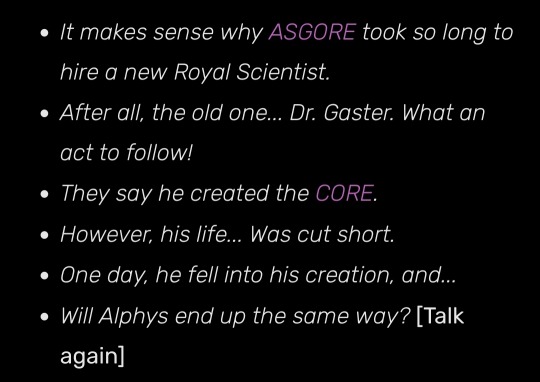
This dialogue is why most theories and fanon built around the idea that Gaster fell into the Core, which for reasons unknown to us erased him from existence. But I'm now pretty convinced that this is a red herring, because it doesn't actually say Gaster fell into the Core. It says he made the Core, and that he fell into his creation.
It does not say that this creation is the Core.
The dialogue is written in a way that leads you to assume the creation he fell into was the Core, but that doesn't really make much sense considering the rest of the dialogue.
The dialogue says "they say he created the Core," which implies this is second hand knowledge, but then says with certainty "One day, he fell into his creation." Why do they know for sure he fell into "his creation," but only knows he created the core from what others say?
If you talk to the follower again, they say "Will Alphys end up the same way?" Why would Alphys also fall into the Core? As far as we know, Alphys doesn't maintain the Core; if I remember correctly, a few monsters at Mettaton's hotel are stated to work in the Core, so wouldn't this follower be more concerned that those monsters will end up like Gaster and not Alphys?
And another question that I think fanon has just ignored due to the assumption it was something we don't yet know about, but I am now wondering about: Why would falling into the Core erase Gaster from time? When traveling through Hotland and viewing the Core in the distance, Alphys says this:
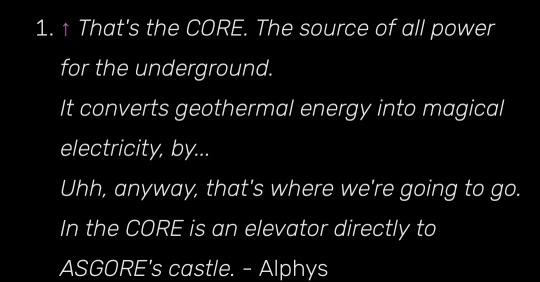
And while this dialogue may at first seem indicative that the Core is more mysterious than a normal geothermal power generator (and it is in some ways), remember: Alphys didn't build the Core. Alphys doesn't understand how the Core works, not because it has some unnatural property that could erase people from space time, but because she didn't build it. Not only does this mean that the Core is likely just a power generator that utilizes the lava in Hotland to produce geothermal energy and convert it to electricity, it also means that Alphys doesn't work on the Core, because she doesn't know how it works. So why would the Gaster follower worry about Alphys ending up like Gaster if she doesn't have any involvement with the Core?
Additionally, that Gaster follower is the only one to mention the Core in relation to Gaster. In fact, one of the other followers says something that could be interpreted as actively contradicting his erasure being caused by the Core:
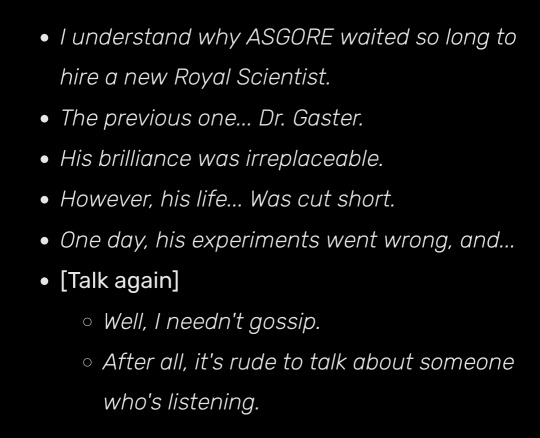
This follower says "his experiments went wrong," and doesn't mention the Core. Why would Gaster be experimenting with the Core? And if he was, we don't know anything about it.
But you know what experiments we do know Gaster was working on, because it's literally one of the only pieces of dialogue we have from him?
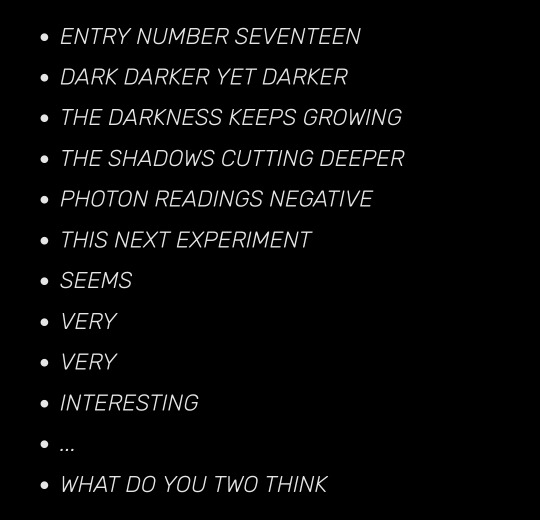
And do you know what other creation was presumably made by Gaster, as Alphys is unfamiliar with it's operation? That is also a creation that was actively being used in experiments, which Alphys is continuing to perform herself? Experiments that are directly involved with something we already know can alter time and space? A creation that is located in one of the most mysterious areas in the game with several oddities in it that are straight up never explained, multiple fourth wall breaking moments, and a couple explicit references to things we believe are associated with Gaster? A creation that suspiciously resembles in appearance the form of a character who canonically can alter time and space, not to mention resembling the thing that's literally called a GASTER BLASTER???
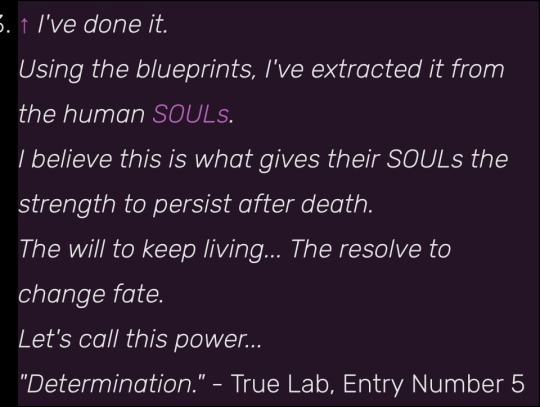
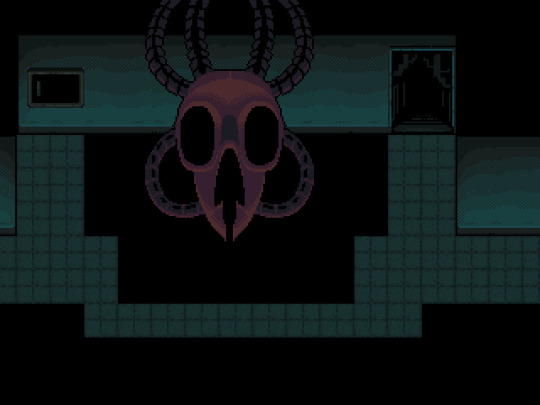
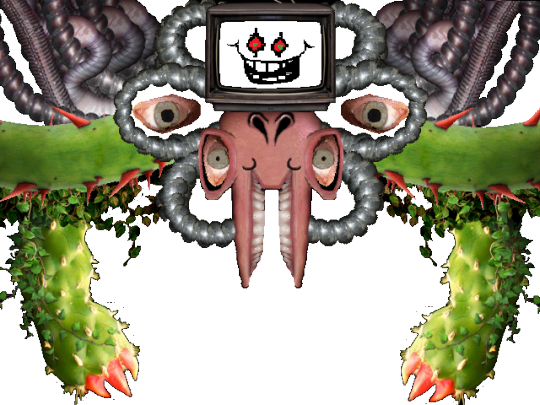

#ignore the crusty spriters resource gaster blaster. google images is useless when it comes to finding actual gameplay screenshots.#anyways I may be completely out of the loop and everyone already knew this. but also the whole Core thing was basically accepted fanon#back in the day. and i only just realized it probably is a misinterpretation like less than a week ago#im not sure the determination extractor is the creation he fell into. but i think the creation he fell into is related to the extractor#also when looking up stuff for this i came upon the information that the tree man may be referenced in the true lab#when you enter the room filled with fog and try to inspect things it mentions a tree and a man.#not to mention the true lab being the debut of everyman of course.#and whatever the FUCK is up with the memory heads. who have a suspicious connection to phones btw.#actually Gaster has an incredibly suspicious connection to phones. like the spamton thing obviously but his presence seems to fuck up phone#the memory heads. the garbage noise in the dark world. hell GRANDPA SEMI is even directly related to phones.#considering one of the only two places he is mentioned is in a list of characters to have phone call events in the code of the demo.#also the art book mentions that the phone itself was originally a character. which kinda ties into the unused video game content theme.#this doesn't have much to do with this post im just rambling now.#anyways tl;dr i am now a 'gaster did not fall into the core' truther#undertale#deltarune#ut/dr#ut/dr theory
32 notes
·
View notes
Text
on a completely different subject. one thing i really like about the "role-playing" system for ffxiv's story quests (where you're given control of an npc for a gameplay section) is that they frequently have to strip the mechanics of the npc's class/job waaaay down, because they don't want to throw you straight into the deep end of some complex gameplay loop you've never used before, BUT, they also take that opportunity to both rearrange and reskin some of the class abilities that get retained. leading to the implication that the WoL's version of the class isn't actually the only or even the standard version of the class, and that even people who have the same job learn and implement the fighting techniques in slightly different ways. which i think is really fun and makes a lot of sense and is way more fitting than every single samurai or w/e playing the exact same.
#the nemesis speaks#swift plays ff14#like alisaie's rdm loop. you don't want to throw a balance gauge at the player obviously that would be A Lot but that gauge is SO core-#-to how the rdm class flows in normal gameplay. so playing as her feels completely different to playing as a rdm wol#like iirc they have her cast verholy immediately into verflare (or the other way around?)#which is not how the wol does it. you choose btwn one or the other every gcd loop and then go straight into the big finisher dump#but that's not feasible to implement with the roleplaying system's stripped-down mechanics so they put them both in the same loop#so it really doesn't just feel like playing as a rdm it FEELS like you're playing AS alisaie#who has her own fighting style distinct from yours even tho you both learned from the same exact teacher!#it's neat. i like it. thank you for coming to my ted talk#somebody come hit me with a broom until i start doing my actual work please
6 notes
·
View notes
Text
figuring out gameplay loop and core features is fun bc like yes i will put roguelike elements in my game. not too many but like a little bit for fun you know?
#devlog#can't go too far into it but like#giving wisps slight variation and setting up a core gameplay loop of grabbing characters. doing stuff with them. and then discarding them#basically assembling a miniature build before having to take parts out and swap them like a perpetual ship of theseus
17 notes
·
View notes
Text
monhun generations and monhun 4 are very analogous to rise and world respectively
#the core gameplay loop of generations and rise is so satisfying that it's hard to kind of drop down to 4 and world#but then when you play 4 and world there's all these little details to the characters and the world that's hard to let go of#idk that there's a game this team has made yet that perfectly merges the two elements#let's hope wilds does it
2 notes
·
View notes
Text
so i watched someone play the ffxvi demo yesterday, and...

#final fantasy xvi#the shift of final fantasy from a menu based rpg to an action rpg has been annoying to say the least#the person streaming literally was saying ''muda muda muda'' as he used one of the abilities#those games are fine#those games are NOT final fantasy to me#have those games be ff:gaiden titles like stranger of paradise or dissidia or something#that's totally okay#i'm okay with them being IN the franchise#but the core gameplay loop for the mainline titles should stick to menu based gameplay#this is very ''old man yells at cloud strife'' for me#but it's how i feel on the subject
6 notes
·
View notes
Text
im mad at how perfectly tuned for my brain "roguelite city builder" is (Against the Storm)
like nooo i need to be doing thingsss D:
- ace
#like i have a habit of restarting city builders before really building up into end-game stuff#and this game just went 'hey what if that was the core gameplay loop? :)'
4 notes
·
View notes
Text
it otherwise was a very mid game but I love how Valheim approached survival mechanics not as a nag mechanic but as vital buffs you started your day out with. and base building not as a distraction but something that made recovery and resting more powerful. it really reinforces the core roleplay of being a viking living in a warm and comfortable mead hall decorated with the trophies of your conquest feasting on delicious meats and meads between adventures.
#like ususally the survival mechanics are chore meters and base customization is entirely like a minigame#here it's something you actually benefit from doing in the core gameplay loop
3 notes
·
View notes
Text
What I look like begging hoyo for more frequent ley line overflow events and a zhongli morax skin with his tits out in every update survey

#HEAVY ON THE LEY LINES TOO#I know they won’t ever do it bc god forbid they make their money maker game enjoyable but like. they either need to increase rewards from#ley lines or increase how often they do the overflow event. building characters is a core part of the ga#gameplay loop but actually getting the resources is SO tedious at times it genuinely turns some ppl off#shouting in the void#fish plays: genshin
1 note
·
View note
Text
A while ago I made a post criticizing Overwatch for leaning into superheroic, noble imagery and branding despite the core gameplay loop consisting of around a dozen people who are canonically supposed to be on the same side throwing down for unclear reasons. This same criticism does not apply to the recently-announced Marvel Rivals, as a dozen Marvel superheroes fighting to the death for unclear reasons is more or less a one-to-one adaptation of the source material
#those guys love fighting each other for no reason it's like enrichment for them#thoughts#meta#marvel rivals
9K notes
·
View notes
Note
So what about FATE? How is it not universal as an RPG?
The biggest non-universal dimension of FATE – at least in its modern incarnations – is that it has a very strong set of baked-in assumptions about the relationship between players and player characters.
This is something I've talked about in the past; to somewhat oversimplify, there are roughly four ways for a player in a tabletop RPG to relate to their character:
The Isekai Stance: I am my character, and my character is me. I'll have my character do whatever I myself would do if I happened to be, for example, an elf wizard.
The Actor Stance: I'm an actor, and my character is my role. I'll have my character do what I feel it would be psychologically realistic for them to do under the circumstances.
The Storyteller Stance: I'm a narrator telling a story, and my character is the co-protagonist of that story. I'll have my character do whatever I feel would make for the most interesting story.
The Gamer Stance: I'm a person playing a game, and my character is my playing-piece. I'll do whatever it takes to win.
This generally isn't a useful way to classify either players or games; games typically have weak baked-in assumptions about which stance their players will adopt, and to the extent that these assumptions are present, a game may make different default assumptions for different parts of play. A common set of assumptions is actor mode outside of combat and gamer mode in combat, for example.
FATE is, of course, an exception to the rule, in that it has very strong baked-in assumptions about what stance players will adopt toward their characters, and further assumes that play will occur at least mostly in this mode. The Fate Point economy that forms the core of the gameplay loop 100% assumes that you're going to be playing in storyteller nearly all of the time – the types of decisions it's asking players to make on a moment-by-moment basis are frequently straight up unintelligible from any other perspective.
This is a big part of why suggesting FATE because it can "do anything" can go over like a lead balloon: the folks making this suggestion aren't taking into account the possibility that a given group's players may not vibe with the system's assumptions about how players relate to their characters. Storyteller-mode-all-the-time is actually a fairly uncommon group play style, and it often seems that FATE fans don't realise this!
2K notes
·
View notes
Text
Friendly reminder that the boundaries for what people will accept are crossed long before they stop using your stuff, since humans are fickle creatures that cling to what they know. So undoing the decision that was the last drop causing the keg to overflow will not bring the spilt booze back. It's why everything seems to get worse all the time - We're not willing to join something awful, but if a good thing becomes the something awful, we might use it still. Until the dam is broken and we realise just how much many 'unnegotiable points' it breaks and how deeply it violates our basic standards.
So excited for the Unity execs to wonder why the most recent Unity news update doesn’t regain their userbase and why even more leave after the next year(s) or so when they start finishing their current game projects
#something something user trust thermocline#koboldthoughts#unity#league of legends#you were all thinking it#i still mourn league but it's so toxic to play now#its core gameplay loops nowadays would never catch me like back then#optimal gameplay is making your opponent unable to play or do anything#because time-to-kill is too low and turrets are a joke as a result
216 notes
·
View notes
Text
There’s always going to be a ludonarrative disconnect between a series where harmony with nature and natural preservation is a core theme yet killing and farming hundreds of monsters for loot and pleasure is the core gameplay loop
But I think Wilds has at least struck a strong balance on the narrative front this time by making it seem like harming monsters is something that Hunters and the Guild are genuinely reluctant to do.
The research element is in strong focus, perhaps even more so than in World where it wa s ostensibly the very center of the entire expedition- the Wilds expedition makes every effort to try to learn more about this local environment and you are almost never given a quest that starts with the objective of fighting a monster until high rank- almost every monster you fight during the course of the story is an immediate danger to yourself or others and there are few alternatives to pacifying it.
The Authorizations that are then handed down by handlers feel like they have more meaning than just set dressing, and the more fleshed out characters help reinforce how serious the authorization to Hunt a monster is- no one wants to do this, it’s no one’s first choice and everyone in the expedition feels that way.
Which makes them all the more impactful when you do, and builds up enough narrative goodwill that when you reach High Rank and start spending more time hunting monsters for looser reasons, it doesn’t immediately feel quite as obviously frivolous. You still keep getting sprinkled with story quests that highlight the potential dangers and ecological need for slaying or capturing a monster, but it’s the work done beforehand that helps those work as reinforcements rather than justification alone.
It’s really cool to see and makes the world all that much more immersive.
556 notes
·
View notes
Text
The Kickstarter campaign for isekai fantasy TTRPG This World Summons Too Many Heroes!! is now live! The definitive edition of the game comes with the core rules and all three expansions in digital and print format with new cover art and a fresh new layout. Ten years ago, the Kingdoms of Ceria summoned a hero from another world to save them from the undead army of the Cryptlord. That man was Yuya Muto, a powerful sage with a special power that allowed him to create spell scrolls just by touching the mage whose spell it was. He succeeded in saving the kingdoms, and when he retired for a quiet life afterwards he created hundreds of copies of the summoning scroll for if heroes were needed again. However, as soon as he disappeared into the mountains the kingdoms started coveting each other's scrolls and fighting broke out everywhere for their control. After a decade of scroll theft and reckless misuse, people summoned from other worlds are now all over Ceria and creating more chaos than ever before. To restore the peace, the scrolls must be collected to prevent further tragedy. This World Summons Too Many Heroes!! was first released digitally on itch.io in 2021, followed by the Goddesses Expansion in 2022, the .Dungeon//Tower Expansion in 2023 and the Season of the Sage Expansion in 2024. This project would be the definitive edition of the game, including the core ruleset and all three expansions. The game uses the LUMEN system, designed for power fantasy action games with fast combat and a tight gameplay loop. Players get a chance to regain their strength with every enemy they defeat, making it a game about taking on insurmountable odds and showing off your powers in battle. There six archetypes from Hero to Demon Lord to Bystander, and 25 classes to specialise in: Alchemist, Assassin, Beast, Berserker, Black Knight, Blacksmith, Blood Mage, Brawler, Champion, Enchanter, Healer, Hunter, Knight, Living Weapon, Mage, Magus, Monster, Necromancer, Phantasm, Saber, Sage, Servant, Spellsword, Tamer, and Vampire.
Please support the campaign!
641 notes
·
View notes
Text
One of these days we will get a second high budget and high-quality CRPG created by people who understand that there isn't actually some metaphysical law requiring that they make their core gameplay loop mediocre tactical combat and inventory management.
#I feel like 'the good part of the game is the part you spend most of the time doing'#shouldn't be some secret occult knowledge#and yet
494 notes
·
View notes